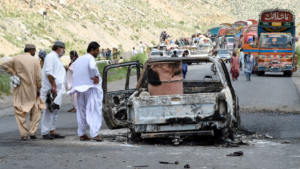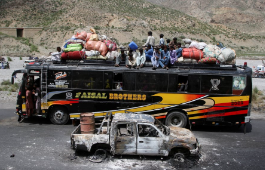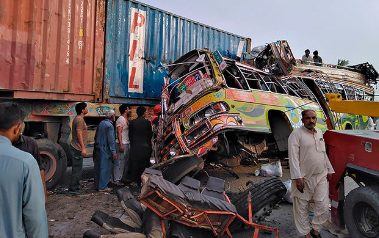Keywords: Balochistan, Pakistan, ethnic militants, Baloch Liberation Army, Munir Ahmed, roadside attack, survival, Quetta, violence, secessionist movement.
Quetta, Pakistan — In a harrowing ordeal that left more than 70 people dead, Munir Ahmed, a 50-year-old truck driver, is recovering in a hospital after being mistakenly presumed dead following a brutal attack by ethnic militants in Pakistan’s Balochistan province. Ahmed, who was shot five times, was found alive among the bodies of his three colleagues when hospital staff discovered his faint signs of life.
The Attack
On Monday, Ahmed was driving in a convoy of four trucks through a remote area of Balochistan, unaware of the violence that had erupted in the region. As they neared the provincial capital, Quetta, armed men suddenly appeared, forcing the drivers to stop their vehicles. The attackers, identified as members of the Baloch Liberation Army (BLA), a militant group seeking the secession of Balochistan, ordered the drivers out of their trucks and lined them up along the roadside. As the men recited Islamic verses in fear, the gunmen opened fire, leaving the victims’ bodies in a nearby stream, assuming all were dead. Similar attacks occurred throughout the region, with militants stopping buses and executing passengers in front of their families, according to the provincial chief minister.
Ahmed’s Survival
Ahmed was initially presumed dead by rescuers, who transported him and his three deceased colleagues to a hospital. However, medical staff soon realized that Ahmed, despite suffering five gunshot wounds to his arm and back, was still alive. He is currently in stable condition, receiving treatment in Quetta’s hospital.
Lying in his hospital bed, with his arm heavily bandaged, Ahmed recounted the terror of the attack. His memory of the event remains hazy, and he is deeply troubled by the loss of his colleagues and the uncertainty surrounding his future.

Widespread Violence
The Baloch Liberation Army, which claimed responsibility for the attack, has a long history of violence in the region. The group seeks independence for Balochistan, a province rich in natural resources but plagued by poverty and political unrest. The attacks on Monday were among the most widespread and deadly in recent years, with over 70 people killed, including 23 civilians who were dragged from their vehicles and executed.
The Pakistani military launched subsequent operations in response to the attacks, aiming to quell the militant activity. However, the violence has left a lasting impact on the region, with many families mourning the loss of loved ones and survivors like Ahmed grappling with the trauma of their experiences.
Aftermath and Ongoing Tensions
Balochistan remains a volatile region, with ongoing tensions between the government and various militant groups. The recent attacks have further escalated fears of instability and raised questions about the security situation in the province.
For Munir Ahmed, the road to recovery will be both physical and emotional. The disruption to his livelihood and the loss of his colleagues have left him uncertain about what the future holds. As he recovers in the hospital, his story serves as a poignant reminder of the human cost of the ongoing conflict in Balochistan.
Background on Balochistan Conflict
History of the Baloch Liberation Army (BLA): Provide data on the history and objectives of the BLA. Include details about their past attacks, key leaders, and the broader secessionist movement in Balochistan.
- Conflict Timeline: Offer a timeline of significant events in the Balochistan conflict, highlighting major attacks, peace efforts, and government responses.
- 2. Casualties and Impact
- Detailed Casualty Figures: Include specific data on the number of people killed and injured in the attack that Munir Ahmed survived, as well as in the broader wave of violence that took place that day.
- Impact on Civilians: Provide data on the impact of the ongoing conflict on civilians in Balochistan. This could include the number of displaced people, casualties over the years, and the effect on local comm
- unities.
- . Security Situation in Balochistan
- Military and Police Operations: Include data on the Pakistani military and police operations in Balochistan aimed at curbing militant activity. This could cover the number of operations conducted, successes, failures, and the ongoing challenges faced by security forces.
- Government and Security Policies: Provide data on government policies and security measures in place to protect civilians and maintain order in Balochistan.
- 4. Healthcare and Emergency Response
- Healthcare Facilities in Quetta: Offer data on the healthcare facilities in Quetta and their ability to handle emergencies like the one Munir Ahmed faced. This could include the number of hospitals, availability of medical staff, and emergency response times.
- Survival Rates in Conflict Zones: Provide data on survival rates for individuals wounded in conflict zones in Pakistan, particularly in Balochistan. This could include statistics on the effectiveness of emergency medical care and transport.
- 5. Economic Impact on Trucking Industry
- Impact on Trucking and Transport Industry: Include data on how the conflict in Balochistan has affected the trucking and transport industry. This could cover economic losses, increased security costs, and the impact on trade routes.
- Employment and Livelihoods: Provide data on the number of people employed in the trucking industry in Balochistan and how the conflict has disrupted their livelihoods.
- 6. Humanitarian Issues
- Displacement and Refugee Data: Include data on the number of people displaced by the conflict in Balochistan. This could include statistics on refugee camps, the humanitarian response, and the challenges faced by displaced populations.
- Human Rights Violations: Provide data on reported human rights violations in the region, including those committed by militants and government forces.
- 7. Local and International Reactions
- Government and Local Responses: Offer data on the Pakistani government’s response to the attack, including statements from officials, policy changes, and any new security measures implemented.
- International Community’s Role: Provide data on how the international community, including the United Nations and human rights organizations, has reacted to the conflict in Balochistan. This could include sanctions, diplomatic efforts, and humanitarian aid.
- 8. Psychological and Social Impact
- Psychological Trauma: Include data on the psychological impact of such attacks on survivors like Munir Ahmed and the broader community. This could cover access to mental health services and the prevalence of PTSD among survivors.
- Social Impact on Families: Provide data on how the conflict affects the families of victims and survivors, particularly in terms of economic hardship, displacement, and social stigma.
- 9. Legal and Justice Aspects
- Prosecution of Militants: Offer data on the legal measures taken against militants in Balochistan. This could include the number of arrests, trials, and convictions related to BLA activities.
- Justice for Victims: Provide data on efforts to seek justice for victims of the conflict, including compensation programs, legal support, and community initiatives.
- . Long-Term Prospects for Peace
- Peace Negotiations: Include data on past and ongoing peace negotiations between the Pakistani government and Baloch militant groups. Highlight any progress made and the challenges that remain.
- Future of Balochistan: Provide data on potential future scenarios for Balochistan, including economic development plans, political autonomy, and reconciliation efforts.

